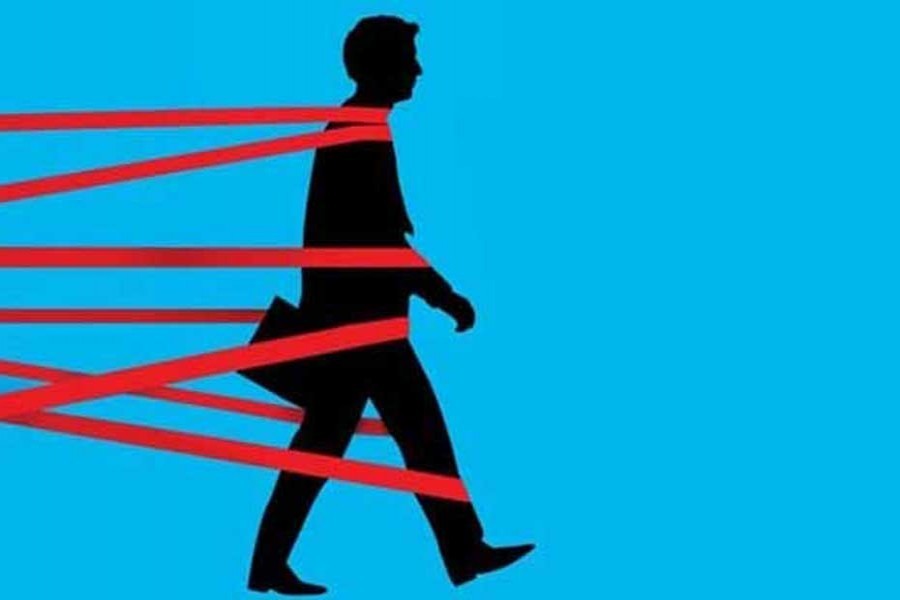A new generation of Bangladeshi entrepreneurs does have a set of expectations that they can try to venture out into uncharted areas of worldly affairs for shining in life; that nobody would disturb their enthusiastic endeavours, let alone extorting money from their hard works; and that at least the state would not create barriers to doing their business as a matter of choice and constitutional right.
These are not too much to expect, obviously not after 50 years of earning independence. Also the declared policies of the government have no disagreement -- there is rather the assurance that entrepreneurial initiatives would be supported, honestly, to help create jobs and attain a higher level of national development.
But, is the situation or the culture of public service delivery anywhere near the expectations that drive enterprising individuals to invest their lives in ventures where success is not guaranteed without due diligence?
The business community has urged the government to stop extortion in the transportation sector for facilitating smooth supply of goods, when their representatives joined a virtual meeting on keeping prices stable during the Ramadan recently.
The home minister, present there, mentioned that the government is tough against the extortionists. Dhaka South City Corporation Mayor Sheikh Fazle Noor added, "Our fight against the extortionists will continue."
The businesspeople, in recent discussions, raised the issue of taxing them excessively, as the revenue board charged a high rate of corporate tax at 35 per cent or so.
Such rate indicates the authorities' consistent failure to widen tax net. It further prompts some businesses to prepare imaginary balance sheets to evade tax. A business leader wondered if a foreign investor would be interested in coming to Bangladesh, after hearing about such a discouraging tax rate.
Starting a business still remains an adventurous act on the part of a Bangladesh youth unless s/he has family-owned business establishment.
And when reputed businesspeople express their genuine frustration about investment climate, the potential entrepreneurs have reasons to choose instead the short-cut path of trying the civil service or entering a job at a multinational company, forgetting his/her dream of becoming an entrepreneur.
In the World Bank's ease of doing business index 2020, Bangladesh's position is 189th among 190 nations. In terms of resolution to commercial disputes, although the country's overall ranking is 168th, still not very attractive to foreign investors. Executive Chairman of Bangladesh Investment Development Authority (BIDA) Md Sirazul Islam, addressing economic reporters this week, regretted the situation and insisted that his agency needs certain authority to serve the investors independently.
Meanwhile, Bangladesh's courts have been burdened with almost four million cases, a number that not only hampers delivery of judgement but also bleeds millions of families who are somehow entangled into litigation.
Bangladesh's businesses often complain about cumbersome rules and vague bureaucratic languages used in official documents as well as across-the board discretion enjoyed by public servants that define the culture of service delivery. Under such circumstances, mainly cronies can take privilege from the establishment. Redundant and conflicting laws limit the authority of even the Anti-Corruption Commission to catch the corrupt elements.
The last caretaker government of 2007-08 had assigned a Regulatory Reforms Commission to simplify the legal and regulatory regime and make it pro-people but its recommendations were just shelved later on.
Dwelling on the backdated laws, rules and regulations, President of the Metropolitan Chamber of Commerce and Industry (MCCI) Barrister Nihad Kabir pointed out that 90 per cent of the old laws is just useless. "The issues the second generation businesspeople are talking about are the same told issues that were discussed by their elders. Unfortunately, they may be discussed in future as we see no reforms," she told a recent webinar organised by the Economic Reporters' Forum.
Tax reform is at the heart of the business leaders' demands for a healthy atmosphere.
However, the finance minister has this week ruled out the possibility of structural reforms in authoring the budget, especially in revenue structuring, for the next financial year, in view of the pandemic which, he said, caused distortion to fiscal measures.
This actually shows a mindset of going by the tide whereas special measures in special situation could have been prudential for the economy.
Reform has always been a bitter pill that nations have to swallow for coming out of prolonged stagnation, at historic turning points. Can Bangladesh deny the demand for reforms that is going to be compulsive in the post-pandemic period for meeting some common needs of the people at that point in time?


